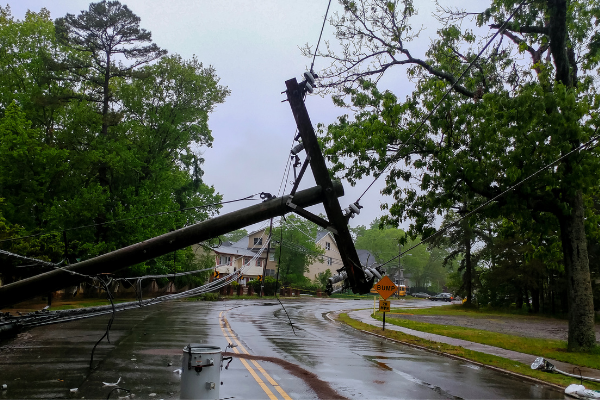
After a childhood of hauling patio furniture in and out and spending several birthdays evacuated from our house, I felt fairly confident in my hurricane season prepping skills. But whether you were a seasoned hurricane prepper or a first-timer in 2020, Sally caught all of us by surprise and gave us a blunt reminder of how important it is to expect the unexpected.
Have a plan, a backup plan, and maybe a backup to your backup- storms have a mind of their own.
The good news is that we can start preparing long before any disturbance comes into the Gulf. There are the obvious to-dos once it’s “go-time”: filling up on gas, doing the laundry, and bringing in the outside toys. People can give you hundreds of tips on preparing, and different systems work for different people. Do your research, talk to neighbors or friends you trust who have been around, and figure out what is best for your location and family.
Whether you lived through Ivan and Sally or this is your first go with a storm season, I hope these are helpful to you as well.
Make Your List of Needed Supplies and Stock Up
June is a great time to get your list together so that if/when something starts stirring up, you only have a few details left to worry about. Florida even has tax-free days on emergency supplies to encourage early shopping (May 27th – June 9th and again August 26th – September 8th). Go through your daily needs like formula, toilet paper, diapers, pet food, and of course, snacks. The general rule of thumb is a gallon of water per day per person/pet and enough supplies to last two weeks. Fortunately, you can always use water and snacks after hurricane season if you don’t end up needing them (just wait until the season is really over!)
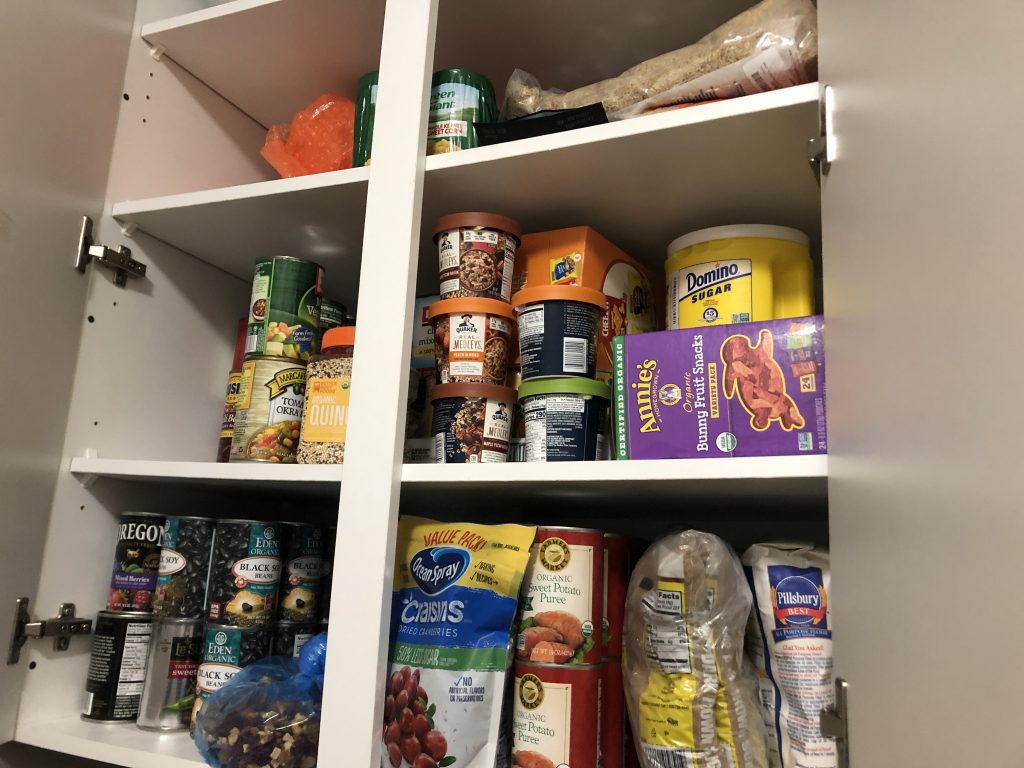
Decide What Needs to be Saved
When I was growing up, my mother had us all pack a Rubbermaid box on the first of June every single year. It had to be small enough to fit in the car, and it could only contain the things we would be devastated to lose. I can’t say that I have been this prepared as an adult, but we know where our important documents are, and we have a mental checklist of the sentimental things we want to ensure are safe. Think about the family bible, a letter from your grandparents, your kids’ baby books- make sure you can get to them quickly and have a waterproof container big enough to hold them.
Things Can Be Replaced – People Cannot.
As kids do, I occasionally groaned and complained (and maybe rolled my eyes) when we packed up and got out of the house ahead of a storm that might or might not actually be “that bad.” Between Hurricane Ivan in 2004 and Hurricane Sally in 2020, I have eaten a lifetime’s worth of crow for all that complaining. We know we should value people over things, but there is nothing like seeing a home – especially your own – destroyed to put that in a crystal-clear perspective.
My husband went through snowstorms, tornadoes, and earthquakes without flinching, but Sally rocked his world. When we got into the third or fourth cone of uncertainty after Sally, he told me, “If this one comes here, you can stay, but you’ll be the only Harris left in this house.”
People have different appetites for going vs. staying. Of course, listen to the authorities when they mandate evacuations. And if you feel the least bit uncomfortable, go. A couple nights in a hotel is well worth the peace of mind of knowing that your family is safe.
Protecting yourself and your family will always be the right decision.
Know Your Evacuation Options Ahead of Time
I will never forget my parents waking me up at 2am the day before Opal came to town. The storm was supposed to go one way, but sure enough, like a moody teenager, she decided to turn the other direction toward Pensacola in the middle of the night. As early as we hit the road, hotels along I-65 were completely booked until Huntsville. We had family in Chattanooga, so some twelve-ish hours later, we rolled into the mountains of Tennessee and camped out for a week.
Hopefully, you have family or friends within driving distance. If not, do some research on hotels, evacuation centers, or even churches and schools in a few different directions and distances. Whether it’s an hour or six away, think about your options if you need to go east, north, or west. Just as importantly, know when is too late to go.
The interstate is one of the most dangerous and downright harrowing places to be during a storm.
At a certain point, being in your house is a better option than trying to outrun Mother Nature (that girl can move when she wants to!)
The Helpers Will Come When You Need Them – Try to Be One When You Can
Hurricane season can be a stark reminder of how much we need each other and how lucky we are to live in a community of helpers.
I’ve always bragged about how well Pensacola and its people take care of each other, and hurricane seasons over the years have given us more than enough opportunities to prove that.
After the eyewall has passed and the rain has finally stopped, someone will need an extra tarp, a place to stay, or a shoulder to lean on. I’ve usually felt that the adrenaline rush that comes before a storm arrives makes prepping easy. The long cleanup that can come afterward is when extra hands, a place to do laundry, or even a home cooked meal become crucial.
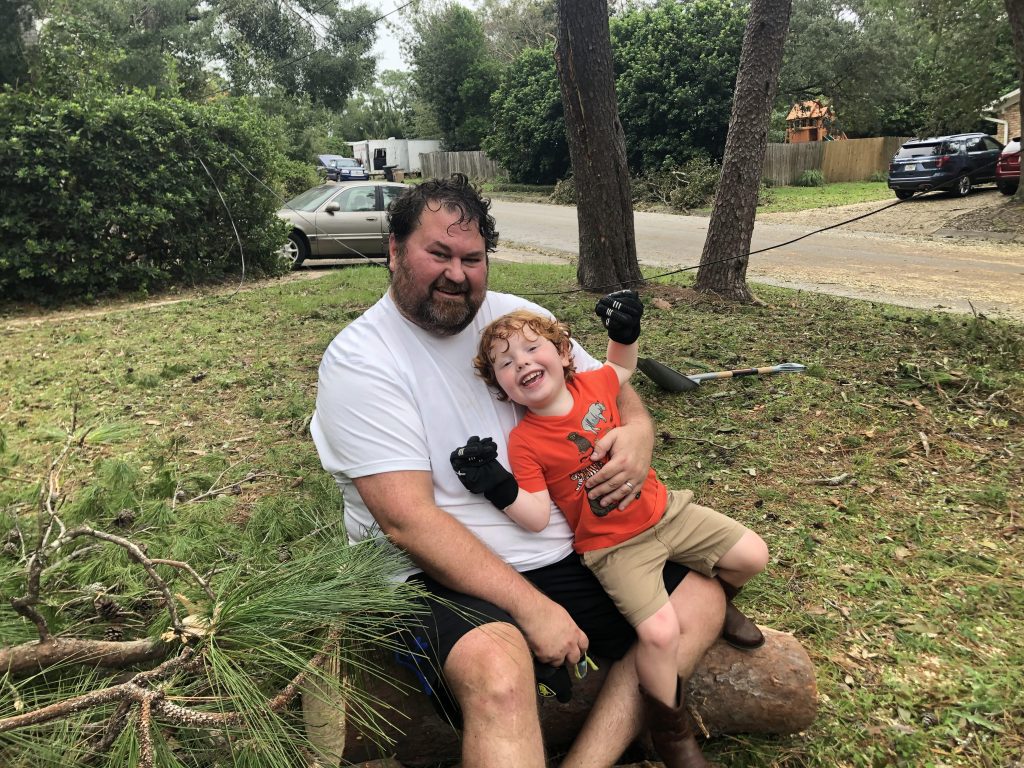
In 2004, we were the ones who needed help. After Sally, we were fortunate to be able to help friends. Watching neighbors come through for each other has always given me hope in the midst of post-storm destruction.
After becoming a parent, the community bond struck even more deeply. I got to witness our kids watching and learning how to show up for their neighbors. Hurricanes can be some of the most devastating natural events to go through, but they can also bring neighbors and strangers together in truly inspiring ways.


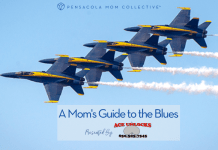





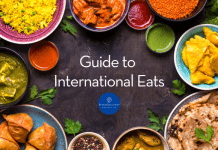





[…] we’re going on a long car trip. It comes along for boat days and is also a great thing to have ready in case of a hurricane evacuation. For plane trips, I simply choose a few of the items out of it or let my kids pack their own […]